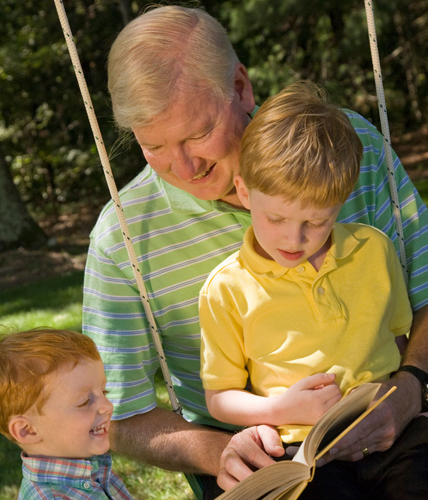Your two-year-old is just beginning to understand
that the world extends beyond his immediate family. Grandparents, aunts,
uncles, cousins, and friends are starting to play more of a part, too.
He will also become more aware of the differences between being a boy
and being a girl.
“Yasmin’s grandparents are important in her life. She has a special relationship with them, which is wonderful for us to see.”
—“Yasmin’s grandparents are important in her life. She has a special relationship with them, which is wonderful for us to see.”
Understanding that
there are other people in his world helps your toddler develop social
skills, and enables him to develop self-awareness and an understanding
of the existence and meaning of relationships.
Important people
Your toddler is getting to know his wider family. The relationship
between grandparent and grandchildren is often one of the most special
and most loving.

Getting along with others
As well as having
siblings and burgeoning friendships, your toddler may also have cousins
as playmates. In some families these relationships are among the
strongest that children develop through life. How well the children bond
will depend to some extent on how relaxed the relationship is between
the parents. Even though two adults have been brought up by the same
parents, they may have radically different views on the “correct” way to
bring up their own children, and toddlers can easily pick up on any
tensions and differences.
A simple way to get
around differences of adult opinion on the “best” approach to parenting
is to agree to respect the house rules of the home you are in. Children
are happiest when their parents are happy. If the adults agree to
compromise—so can they.
Practicing sharing and role-play
All relationships
offer toddlers the opportunity to understand how to share and take
turns. You can help your toddler to develop self-awareness and to
remember what is expected of him by modeling the kind of behavior that
you expect, and by describing to him what you would like him to do. For
example, “Tommy, here is Martha. Martha is your cousin [explains
relationship] and she would like to play with you [explains
expectation]. Would you like to play with Martha? [gives him control]”
When Tommy nods, his mother continues. “Good idea—that’ll be fun [gives
him praise]! I will come and help you [allows him to feel safe].” Had
Tommy said “No,” then rather than force the issue his mother might have
suggested that she would play with Martha and that Tommy could come and
watch.
Children will begin to get
more of a sense of their own gender at this age, through pretend play
and role-playing with other children, and also through observing adult
behavior. There is a tendency for girls to begin to model themselves on
their mothers at this age. Boys, on the other hand, tend to seek out
practical role models such as construction workers, firemen, soldiers,
or perhaps members of their father’s profession. It tends to be
role-play during pretend play that reinforces our idea of our own
gender, along with the messages we receive from those around us. This
will become more sharply focused once your child starts school.
In praise of grandparents
The decision to return
to work while your child is still a toddler is often a necessity rather
than a choice for modern parents. For those who feel that it is too soon
for their child to attend preschool, having him cared for by
grandparents is often the obvious answer. The situation allows
grandparent and grandchild to bond closely, and the chances are that the
approach to caregiving will be fairly similar to at least one of the
parents.
Top tips for grandparents
While you may enjoy looking after your grandchildren, keep in mind that it might not always be easy.
Agree on some
ground rules. Toddlers are highly intuitive and will soon discover that
they can divide and rule. Find out from your son or daughter which home
rules are absolutes, and which are more flexible, and do your best to
stick to the agreement.
Caring
for your grandchild doesn’t mean you need to be exhausted by him. Let
him do the racing around. Don’t feel you have to join in. Your
encouragement and love are enough.
Speak
up if you feel you are being taken advantage of. Loving your grandchild
doesn’t mean you always have to agree to take care of him.
Try
not to criticize the parents. Raise concerns about your grand-child’s
behavior rather than pre-judging the cause or their response.